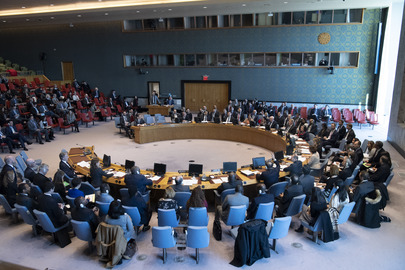In Gaza, a ‘man-made drought’ is causing more misery: UNICEF
In addition to mass starvation in Gaza, a “man-made drought” is causing even more misery, the UN Children’s Fund (UNICEF) said on Wednesday.
In an update, the agency’s Ricardo Pires described seeing children drinking dirty water, because clean water production is 40 per cent of what it used to be across the war-torn enclave.
Meanwhile, people continue to risk their lives seeking food assistance from non-UN aid distribution hubs supported by the US and Israel, Mr. Pires told UN News:
“We managed to go to the south, very close to the GHF – to the Gaza Humanitarian Foundation distribution site – and we visited a field hospital run by the ICRC. And it was staggering to hear and see what’s happening there. The amount of mass casualty events is increasing day in, day out, including with a lot of children being injured and killed while desperately trying to get food and aid, while, of course, being suffering of malnutrition and hunger. It’s an absolutely apocalyptical situation. It’s hard to believe what your eyes actually show you. And and yet there it is.”
The UNICEF officer warned that drinking dirty water leaves children in particular vulnerable to diarrhoea outbreaks and meningitis, which can be deadly if left untreated.
There are around one million children in Gaza, Mr. Pires noted.
He said that needs are massive and increasing every day, everywhere across the Gaza Strip, while most Palestinians there are now gathering in the south.
Tsunami alert highlights worth of global early warning system
Early warning systems kicked in across Pacific nations after a massive earthquake in eastern Russia triggered a sea surge, disaster relief experts said on Wednesday.
In Japan – whose coastline is around 1,000 kilometres or 620 miles away from Russia – the 8.8 magnitude quake prompted evacuation orders for coastal communities.
Alerts were sent out within a few minutes of the Russia quake, according to the UN Office for Disaster Risk Reduction (UNDRR).
And although the authorities have now downgraded the threat across Japan, the advice is for people to stay in shelters until the danger diminishes from continuing sea surges.
Kamal Kishore, Special Representative of the UN Secretary-General for Disaster Risk Reduction, said that tsunami alerts highlight how important it is for countries to share data so that they processed by early warning systems:
“You know, there are countries which are separated by thousands of kilometers of ocean…and if you do not share information on observing these hazards, not just in the location where they have occurred but on what is happening in the intermediate locations in the ocean…we will not be able to warn our citizens.”
80,000 children at high risk of cholera as outbreaks spread across 12 countries in West and Central Africa
An estimated 80,000 children are at high risk of cholera as the rainy season begins across West and Central Africa.
The warning from UNICEF comes as cholera continues to spread in the Democratic Republic of the Congo and Nigeria, raising the threat of transmission in neighbouring countries.
The UN agency noted that Chad, the Republic of Congo, Ghana, Côte d’Ivoire and Togo are also confronting ongoing epidemics, while Niger, Liberia, Benin, Central Africa Republic and Cameroon, remain under close surveillance.
Urgent and scaled-up efforts are needed to prevent further spread and contain the preventable disease across the region, UNICEF insisted.
It said that heavy rains, widespread flooding and the high level of displacement are fuelling the risk of cholera transmission and putting the lives of children at risk.
The Democratic Republic of the Congo has been the hardest-hit, with more than 38,000 cases and 951 deaths.
Daniel Johnson, UN News.
Source of original article: United Nations (news.un.org). Photo credit: UN. The content of this article does not necessarily reflect the views or opinion of Global Diaspora News (www.globaldiasporanews.com).
To submit your press release: (https://www.globaldiasporanews.com/pr).
To advertise on Global Diaspora News: (www.globaldiasporanews.com/ads).
Sign up to Global Diaspora News newsletter (https://www.globaldiasporanews.com/newsletter/) to start receiving updates and opportunities directly in your email inbox for free.
































